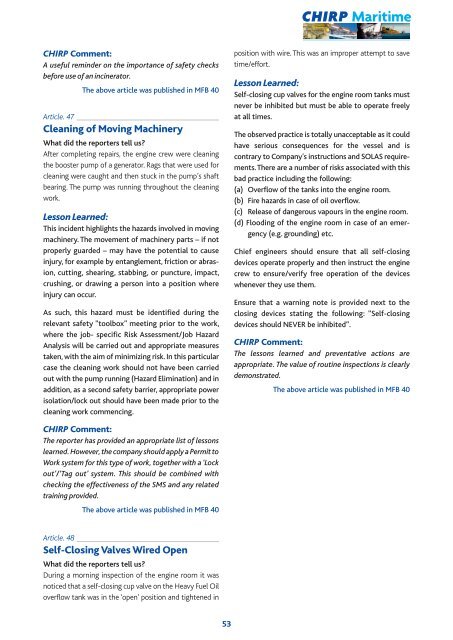CHIRP annual digest 2016 6th
Create successful ePaper yourself
Turn your PDF publications into a flip-book with our unique Google optimized e-Paper software.
<strong>CHIRP</strong> Maritime<br />
<strong>CHIRP</strong> Comment:<br />
A useful reminder on the importance of safety checks<br />
before use of an incinerator.<br />
The above article was published in MFB 40<br />
Article. 47<br />
Cleaning of Moving Machinery<br />
What did the reporters tell us?<br />
After completing repairs, the engine crew were cleaning<br />
the booster pump of a generator. Rags that were used for<br />
cleaning were caught and then stuck in the pump’s shaft<br />
bearing. The pump was running throughout the cleaning<br />
work.<br />
Lesson Learned:<br />
This incident highlights the hazards involved in moving<br />
machinery. The movement of machinery parts – if not<br />
properly guarded – may have the potential to cause<br />
injury, for example by entanglement, friction or abras -<br />
ion, cutting, shearing, stabbing, or puncture, impact,<br />
crushing, or drawing a person into a position where<br />
injury can occur.<br />
As such, this hazard must be identified during the<br />
relevant safety “toolbox” meeting prior to the work,<br />
where the job- specific Risk Assessment/Job Hazard<br />
Analysis will be carried out and appropriate measures<br />
taken, with the aim of minimizing risk. In this particular<br />
case the cleaning work should not have been carried<br />
out with the pump running (Hazard Elimination) and in<br />
addition, as a second safety barrier, appropriate power<br />
isolation/lock out should have been made prior to the<br />
cleaning work commencing.<br />
position with wire. This was an improper attempt to save<br />
time/effort.<br />
Lesson Learned:<br />
Self-closing cup valves for the engine room tanks must<br />
never be inhibited but must be able to operate freely<br />
at all times.<br />
The observed practice is totally unacceptable as it could<br />
have serious consequences for the vessel and is<br />
contrary to Company’s instructions and SOLAS require -<br />
ments. There are a number of risks associated with this<br />
bad practice including the following:<br />
(a) Overflow of the tanks into the engine room.<br />
(b) Fire hazards in case of oil overflow.<br />
(c) Release of dangerous vapours in the engine room.<br />
(d) Flooding of the engine room in case of an emer -<br />
gency (e.g. grounding) etc.<br />
Chief engineers should ensure that all self-closing<br />
devices operate properly and then instruct the engine<br />
crew to ensure/verify free operation of the devices<br />
whenever they use them.<br />
Ensure that a warning note is provided next to the<br />
closing devices stating the following: “Self-closing<br />
devices should NEVER be inhibited”.<br />
<strong>CHIRP</strong> Comment:<br />
The lessons learned and preventative actions are<br />
appropriate. The value of routine inspections is clearly<br />
demonstrated.<br />
The above article was published in MFB 40<br />
<strong>CHIRP</strong> Comment:<br />
The reporter has provided an appropriate list of lessons<br />
learned. However, the company should apply a Permit to<br />
Work system for this type of work, together with a ‘Lock<br />
out’/‘Tag out’ system. This should be combined with<br />
checking the effectiveness of the SMS and any related<br />
training provided.<br />
The above article was published in MFB 40<br />
Article. 48<br />
Self-Closing Valves Wired Open<br />
What did the reporters tell us?<br />
During a morning inspection of the engine room it was<br />
noticed that a self-closing cup valve on the Heavy Fuel Oil<br />
overflow tank was in the ‘open’ position and tightened in<br />
53



